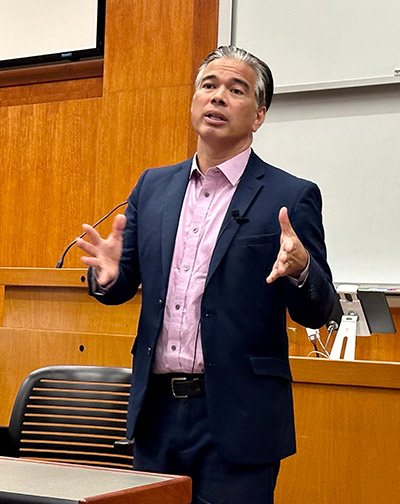
By Andrew Cohen
California Attorney Rob Bonta often hears the chatter that top law schools house the next generation of leaders. Frankly, he’s not buying it.
“A lot of times, they say, ‘You’re the leaders of tomorrow.’ But in many ways, you’re the leaders of today,” Bonta said during a recent visit to Berkeley Law before a packed lecture hall of students. “You have the agency, power, and authority to make our world better, and in many ways you’ve already done that.”
Noting the resilience required to navigate a global pandemic and the escalation of hate, climate dangers, gun violence, and domestic attacks on democracy, Bonta hailed law students for powerfully demanding more urgent responses to these and other problems.
The first Filipino-American attorney general in California, Bonta came to the United States when he was two months old after his political activist parents left the Philippines to pursue a safer life with greater opportunities. The country declared martial law on his first birthday, leading to a unique tradition every September 22 where his parents would organize both his birthday party and a protest to restore democracy back home.
Bonta’s parents, who met in Berkeley in 1965, set the example he wanted to follow. Fierce advocates for social justice in the Philippines and the U.S., they worked for United Farm Workers, setting up health care clinics and leading other initiatives that led to rights Bonta said are now taken for granted — such as water, shade, and bathroom breaks.
“Berkeley was a place of great change and a place of questioning the status quo,” he said. “People were demanding that we be better as a country. A friend of my dad’s sent him an audio cassette tape of Martin Luther King Jr. talking about a more just world and a fair society, and my dad felt called. He traveled on a train for three days and organized in the South for voting rights and civil rights.”
Bonta went to Yale on a soccer scholarship, then graduated from Yale Law School. He worked as a federal judicial clerk, was a litigation associate at Keker & Van Nest, then entered the public sector as a deputy city attorney for the City and County of San Francisco. Elected to the Alameda City Council in 2010 and to the State Assembly in 2012, he was appointed attorney general in April 2021 when Xavier Becerra resigned to become U.S. Secretary of Health and Human Services and then won a four-year term in November 2022.
Family lessons

“My goal was to carry on my parents’ legacy,” Bonta said. “They didn’t just tell me about social justice — they showed me. I saw a lot of elected officials decline their offers to stand with them on various issues, and I thought I’d like to become an elected official who was more responsive to the people.
“The Assembly totally changed the way I looked at law. It wasn’t just what is, it was what could be. Being appointed attorney general was life changing, this mixture of law, policy, and politics all in one while leading the largest state Department of Justice. I see my role as fighting for everyday people on issues like crime, homelessness, hate crimes, fentanyl, corporate accountability, gun violence, and climate. Law gives you this incredible ability to see how the world works and to help change its direction if you don’t like where it’s going.”
Answering questions from Dean Erwin Chemerinsky and audience members after his initial remarks, Bonta fielded questions on subjects ranging from animal rights to how best to navigate law school. He also discussed the challenging task of enforcing laws, such as the death penalty, that he personally opposes.
Bonta established the state’s first post-conviction justice unit to examine capital and other prosecutions in order to ensure more fairness and accountability. Describing how the barriers to reentry from incarceration are “too big and too many,” he added that the criminal justice system should make people safe and also be just — and that arguments overloaded on just one side of that equation miss the mark.
“Problems aren’t always getting the solutions that they need. No pressure, but that’s where you come in,” he told the students. “You have a clarity in your generation that we don’t have in mine. You’re able to say Black lives matter because they do. You’re able to demand more in our response to gun violence. Soon you won’t be demanding more from someone else, you’ll be demanding more from yourselves.”
Asked for his advice to today’s law students, Bonta urged eliminating the peripheral noise and making authentic choices.
“Be more present and listen to your heart more,” he said. “Don’t jump too quickly into the things presented in front of you. Happiness and job satisfaction are everything. There are going to be people around you who have expectations of you, but go where your heart wants you to go.”